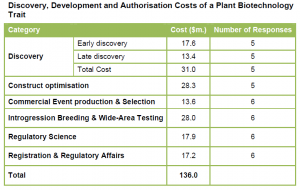Are GMO Crops Regulated and if So, by Whom?
go.ncsu.edu/readext?371238
en Español / em Português
El inglés es el idioma de control de esta página. En la medida en que haya algún conflicto entre la traducción al inglés y la traducción, el inglés prevalece.
Al hacer clic en el enlace de traducción se activa un servicio de traducción gratuito para convertir la página al español. Al igual que con cualquier traducción por Internet, la conversión no es sensible al contexto y puede que no traduzca el texto en su significado original. NC State Extension no garantiza la exactitud del texto traducido. Por favor, tenga en cuenta que algunas aplicaciones y/o servicios pueden no funcionar como se espera cuando se traducen.
Português
Inglês é o idioma de controle desta página. Na medida que haja algum conflito entre o texto original em Inglês e a tradução, o Inglês prevalece.
Ao clicar no link de tradução, um serviço gratuito de tradução será ativado para converter a página para o Português. Como em qualquer tradução pela internet, a conversão não é sensivel ao contexto e pode não ocorrer a tradução para o significado orginal. O serviço de Extensão da Carolina do Norte (NC State Extension) não garante a exatidão do texto traduzido. Por favor, observe que algumas funções ou serviços podem não funcionar como esperado após a tradução.
English
English is the controlling language of this page. To the extent there is any conflict between the English text and the translation, English controls.
Clicking on the translation link activates a free translation service to convert the page to Spanish. As with any Internet translation, the conversion is not context-sensitive and may not translate the text to its original meaning. NC State Extension does not guarantee the accuracy of the translated text. Please note that some applications and/or services may not function as expected when translated.
Collapse ▲Yes, they are regulated. GE crops are regulated under 3 agencies in the US. Each of these agencies regulates GE crops from a different perspective and a crop may fall under more than one agencies for regulation. This process is called the Coordinated Framework for Regulation of Biotechnology.
USDA is involved from a plant pest viewpoint. This includes concerns that the GE crop might cross with a wild relative. USDA is also involved concerning plant pests used in the transformation process or is the contributor of any part of the gene construct. Examples would be the use of the 35S promoter which was derived from cauliflower mosiac virus and the use of agrobacterium in the transformation process.
EPA regulates any GE crop that are pesticide related. This would include GE crops that produce biopesticides like Bt insect resistant crops. They also have to approve any pesticide tolerances, such as herbicides involved in herbicide tolerant GE crops.
FDA reviews the information provided by the company, university or public entity to determine if the GE crop is “substantially equivalent” to its conventional counterpart. This step is not currently mandatory and is called a consultative process. To date all entities have provided these data. There is currently legislation in congress that would make this process mandatory. Companies and other GE crop producing entities have supported this measure as they are already providing these data.
GE crops produced by large companies on crops grown worldwide also have to satisfy the regulatory system of not only the countries they would like to sell seed in, but also the countries that might import GE agricultural crops for human or animal consumption. This process is very expensive and is not required for any other crop development method, including mutation breeding using chemical or radioactive mutagens.
The chart below illustrates how expensive it is to develop a GE crop and how much of the expense goes to satisfy the regulatory process. These data are from a study conducted by CropLife in 2011.
See more detailed information about GE crop regulation.
Keith Edmisten, Professor of Crop Science



